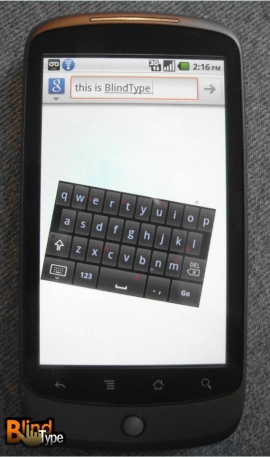Google buys a promising startup BlindType

Back in July, Habré mentioned an interesting startup BlindType, the creators of which developed a new type of virtual keyboard for mobile devices that ignored input errors. In other words, the user does not need to type “aiming” - the main thing is to get at least next to the desired key, and the desired word will appear on the screen. An example is the typed word “tyor”, which the smart program immediately converts to “type”. BlindType is something like “T9 on steroids”, only this system is much more advanced than “T9”. So, the other day, Google has announced that this startup has joined the list of assets of the company.
At the same time, startup developers automatically become part of the Google team, continuing to work in the interests of the corporation. It is clear that Kostas Eleftheriou and Panos Petropoulos (Panos Petropoulos) (despite the Greek surnames and names - Americans), are pleased that Google has paid attention to their undertaking. “We’re excited to join Google, and we see this as a great opportunity to create innovation in the mobile realm,” says BlindType on the blog .
')
The program BlindType, according to the developers, "can" adapt to the location of the input area, and puts a virtual keyboard right under the user's fingers. Thus, you can even type text diagonally - BlindType recognizes the position of the fingers, and adapts the location of the virtual keyboard. Replacing corrupted, erroneously typed words works through the built-in dictionary. It is worth noting that BlindType works with different languages and different layouts, not only with qwerty. As in "T9", if the typed word is still not recognized, you can add it to the dictionary, and the next time the program will do everything correctly.
The features of the BlindType software are shown in the video below. It seems that just such a program was expected by many mobile device users, especially those who have been in transport for a long time or like typing on the go. So far, the software has been created only for mobile operating systems Android and iOS. It is a pity that for WinMo there is no analogue.
Via CNET
Source: https://habr.com/ru/post/105442/
All Articles